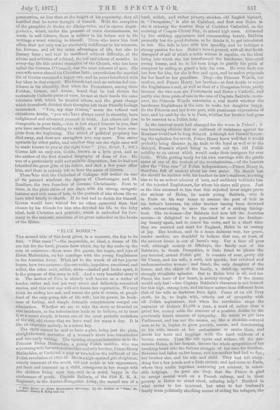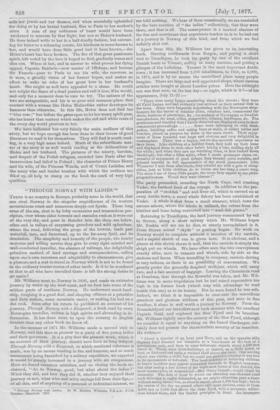"BLUE ROSES."*
Twr second title of this book gives, in a measure, the key to its first. " Blue roses 1"—the impossible, an ideal, a dream of life too fair for the hard, prosaic facts which day by day make up the sum of existence—these were the quests, the hopes, and joys of Helen Malinofska, on her marriage with the young Englishman in the Austrian Army. What led to the wreck of all her joyous hopes, how two natures—the one noble, impulsive, emotional, and wilful, the other cold, selfish, stern—clashed and broke apart, it is the purpose of this story to tell And a very beautiful story it is. The author of Ve'ra is already well known as a writer of tender, rather sad, but yet very sweet and delicately-conceived stories, and this new one will not lessen her reputation. We may think its ending too sad, and resent the pain it causes, as people fond of the easy-going side of life will ; but its power, its fresh- ness of feeling, and simple dramatic completeness compel our admiration. Whether we are to take the story as founded on real incidents, as the introduction leads us to believe, or to treat it as a novel simply, it forms one of the most pathetic variations of the old, old theme that we have read for many a day, It is like an exquisite melody, in a minor key. The story cannot be said to have a plot, being just the plain, straightforward narrative of a woman's short love-intoxication and too-early waking. The opening chapters introduce us to the Princess Helen Malinofska, a young Polish maiden, who was sojourning with her widowed mother and only brother, Prince Henry Malinofska, at Carlsbad, a year or two before the outbreak of the Polish revolution of 1862-68. She is a high-spirited girl of eighteen. utterly innocent of the world, tall and noble in her appearance, yet fresh and innocent as a child, outrageous in her romps with the children living near her, and in a word, happy in the exuberance of youth. Captain Baldwin, of the 21st K. K. A. Regiment, in the Austro-Hungarian Army, the second son of a * Bane Roses ; or, Helen Halinoiska'e Marriage. By the Author of " Vdro," London : Uoury S. King sad 00. Lard, selfish, and rather poverty-stricken old English baronet, in " Hampshire," is also at Carlsbad, and first sees Helen as ehe is entering the western door of Carlsbad Cathedral, on the morning of Corpus-Christi Day, to attend high mass. Attracted by her striking appearance and commanding beauty, Baldwin, presently has the good-fortune, as he thinks it, to get introduced to her. She falls in love with him speedily, and he indulges a strong passion for her. Helen's love is poured, with all that lavish disregard of self of which a noble woman is capable, on the ideal being into which she has transformed the handsome, blue-eyed young hussar, and he in his turn longs to gratify his pride of conquest by calling so grand a lady his own. He soon finds out her love for him, for she is free and open, and he makes proposals. for her hand to her guardians. They—the Princess Wanda, her mother, and Prince Henry, her brother—at first decide to reject the Englishman's suit, as well as that of a Hungarian lover, partly because the two men are Protestants and Helen a Catholic, and partly also from pride of race in the case of Captain Baldwin; more- over, the Princess Wanda entertains a real doubt whether the handsome Englishman is the man to make her daughter happy. So the Princess and her lover part, with passionate expressions of love, and by-and-by she is in Paris, whither her brother had gone to be married to a Polish lady.
In the interval much had changed for the worse in Poland ; it was becoming obvious that an outbreak of resistance against the Russians would not be long delayed. Although not himself favour- ing the agitation for revolt, Prince Henry knew well that it would probably bring disaster in its train to the loyal as well as to the disloyal, Russia's object being to crush out the old Polish nobility to an extent which would make their intrigues for ever futile. While getting ready for his own marriage with the gentle sister of one of the hottest of the revolutionists,—of the hunters after the " blue rose" of Polish independence,—Prince Henry is therefore, full of anxiety about his own sister. He dreads lest she should be smitten with his brother-in-law's madness, knowing him to be an ardent admirer of hers, and suddenly bethinks him of the rejected Englishman, for whom his sister still pines. Just as the idea occurred to him that this rejected lover might prove the saviour of Helen, he meets young Baldwin, who fa in Paris on his way home to assume the post of heir to. his father's honours, his elder brother having been drowned while endeavouring to save the crew of a sinking fishing- boat. The ex-hussar—for Baldwin had now left the Austrian service—is delighted to be permitted to meet the fascinat- ing beauty again, and to renew his vows, and in a short time they are married and start for England, Helen in an ecstasy of joy. Her brother, and in a more dubious way, her grave, tender mother, are thankful to believe that one, at least, of the ancient house is out of harm's way. For a time all goes- well, although society at Iffiehaye, the family seat of the Baldwins, in South Hampshire, is little fitted to please the gay-hearted, ardent Polish girl. it consists of sour, gouty old Sir Vioary, and his wife, a cold, not ignoble, but subdued and undemonstrative woman ; and Sarah, the only daughter of the house, and the eldest of the family, a dried-up, ageing, and strongly ritualistic spinster. But to Helen love is all, and her Franz, the hero of her heart, is society enough. If the dream would only last I—but Captain Baldwin's character is not formed for this high, .strong love, and his inner nature is as different from that of his wife as darkness from light. Come of an old Tory stobk, he is, to begin with, utterly out of sympathy with all Polish aspirations, and when the revolution stops the payment of Helen's £1,000 a year, a need of, rather than a greed for, money adds the rancour of a positive dislike to the previously latent absence of sympathy. He wants to get into Parliament, and has not the means, so, like a cloddish-natured man as he is, begins to grow peevish, coarse, and domineering to his wife, sneers at her enthusiasms or snubs them, and meets her tears and longings with the hard coldness of a bovine nature. Thus the rift opens and widens, till the pas- sionate Helen, in her despair, throws the whole sympathies of her breaking heart into the forlorn struggle of her race for freedom. Reverses had fallen on her home, and her mother had had to flee ; her brother also, and his wife and child. They had left every- thing but a few jewels and a little money, and had come to Paris, where they nestle together, sorrowing yet content, in miser- able lodgings. So poor are they, that the Prince is glad to. accept menial work on a French railway, and in their poverty is Helen to stand aloof, refusing help ? Baulked in what seems to her innocent, but what to her husband's family seem politically shocking means of aiding the refugees, she
sells her jewels and her dresses, and when scornfully upbraided for doing so by her brutal husband, flies to Paris to her mother's arms. A man of any nobleness of heart would have been awakened to remorse by that flight, but not so Helen's husband. He does indeed write to her in a half-kindly fashion, but entrust- ing his letter to a scheming cousin, his kindness is never known to tier, and would have done little good had it been known,—for Helen's heart has been broken. The fire of that great passionate spirit, left unfed by the love it hoped to find, gradually wanes and clies out. When at last, and in answer to what proves her dying appeal, Captain Baldwin—now master of IfFlehaye, and become Sir Francis—goes to Paris to see his wife, she recovers, as it were, a ghostly vision of her former hopes, and makes an effort to wake an echo of her great love in her husband's heart. She might as well have appealed to a stone. Ho could not relight the flame of a dead passion and call it love, if he would, and only for a moment does he care to try. The natures of the two are antagonistic, and his is so poor and common-place that contact with a woman like Helen Malinofska rather developer its baseness than otherwise. In this life, Helen does not find her ." blue rose ;" but before the gates open to let her weary spirit pass, she has learnt that content which makes the red and white roses of the every-day world precious to her.
We have indicated but very faintly the main outlines of this story, but we hope enough has been done to draw lovers of good literature to read it for themselves. They will find it worth read- ing, in a very high sense indeed. Much of the subordinate mat- ter of the story is as well worth reading as the delineations of Helen and her husband. The pictures of the misery, heroism, and despair of the Polish refugees, crowded into Paris after the insurrection had failed in Poland ; the character of Prince Henry and his wife, of the Princess Wanda, and of Count Ladislas, and the many wise and tender touches with which the outlines are filled up, all help to stamp on the book the mark of very high qualities.



































 Previous page
Previous page